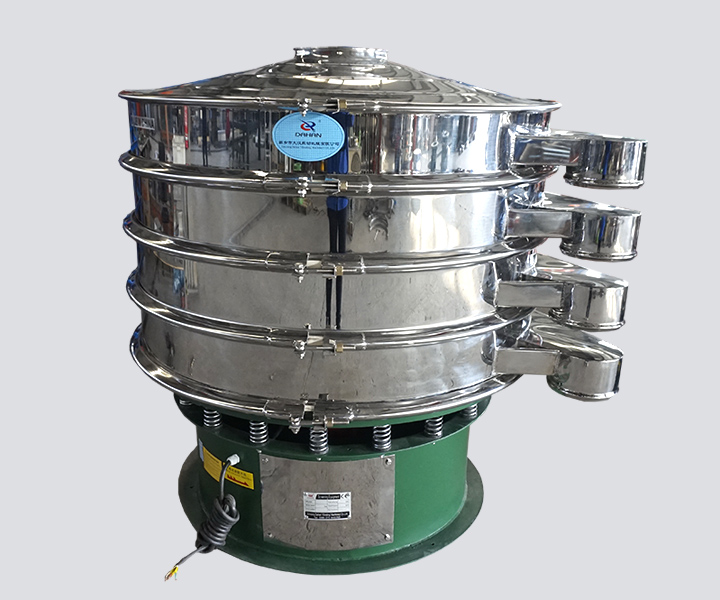
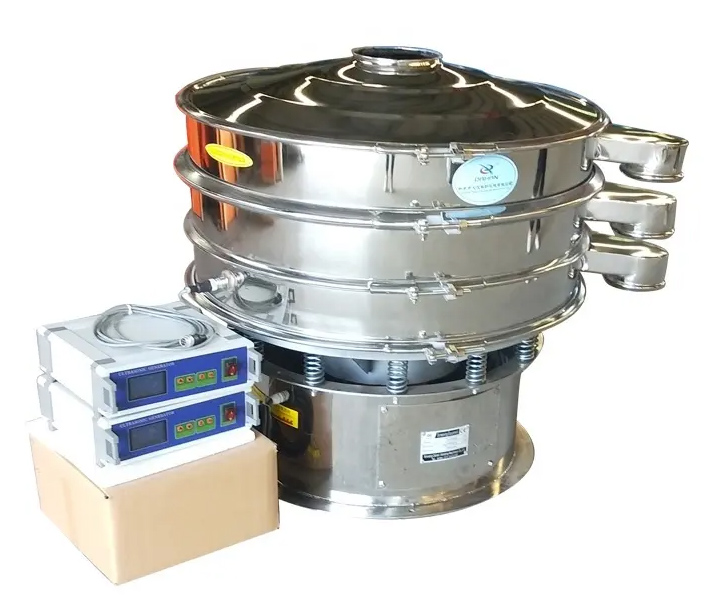
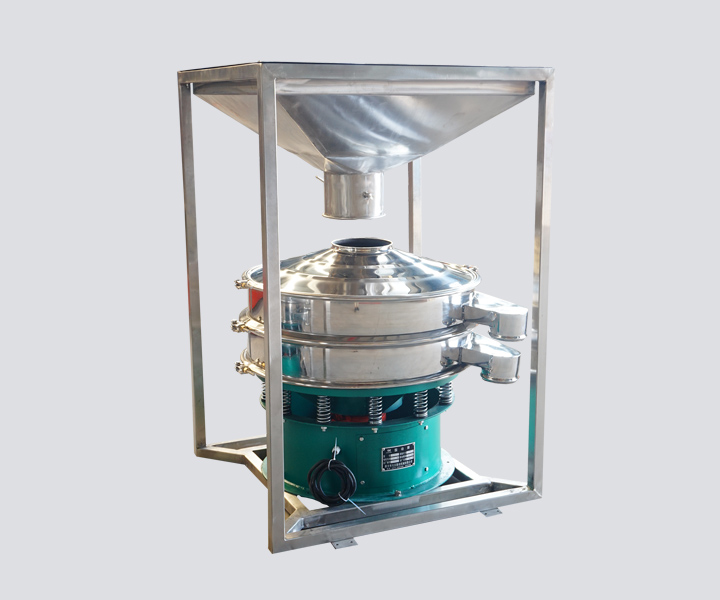
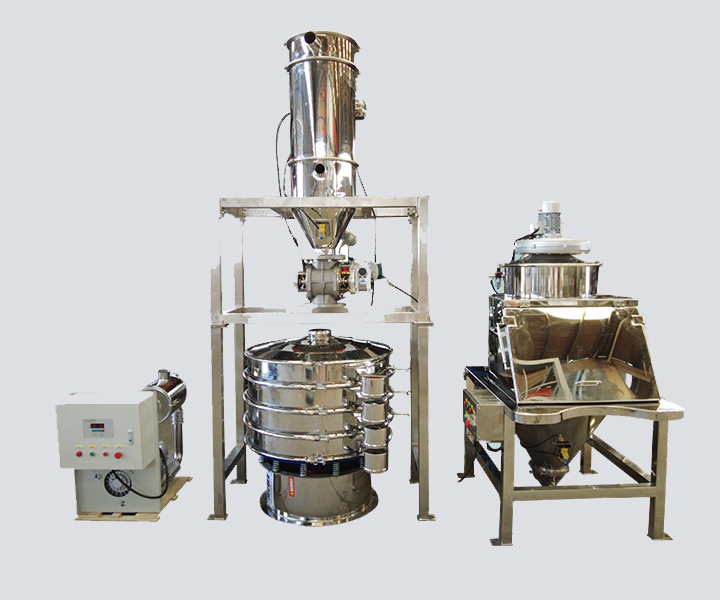
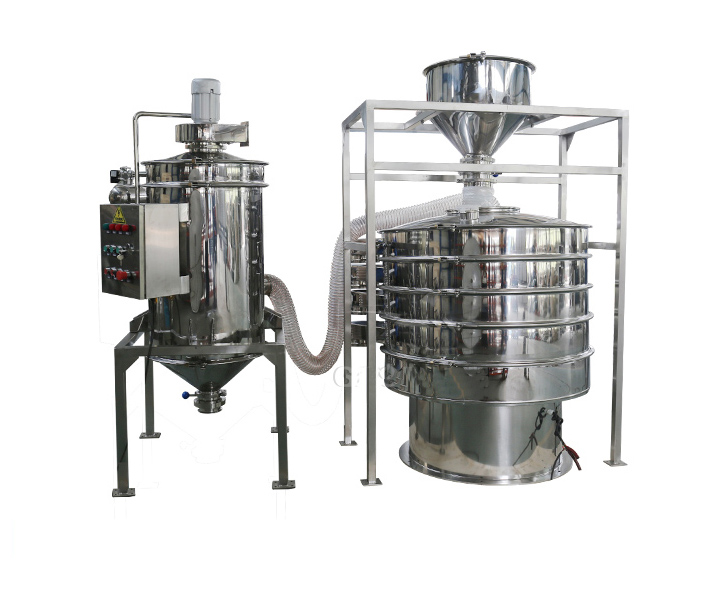





Separates mass components of solids from solids and graded materials based on particle size
![]()
![]()
![]()
Price:$800.00-$4,500.00/Set
Consult now and enjoy a 10% discount
Diameter: 400mm(15"), 600mm(24"), 800mm(31"), 1000mm(39"), 1200mm(47"), 1500mm(59"), 1800mm(70"), 2000mm(78")
Mesh size: 2-500 mesh
Capacity: 100-3300kg/h
Screen frame: 1-5 layers (3 layers is best)
Material: Q235 carbon steel, stainless steel 304 or 316L, polypropylene plastic
Motor power: 0.25Kw to 2.2Kw or customized
Application: It can be used for screening, classification and solid-liquid separation in pharmaceutical, chemical, food and metal powder industries.
Commitment:
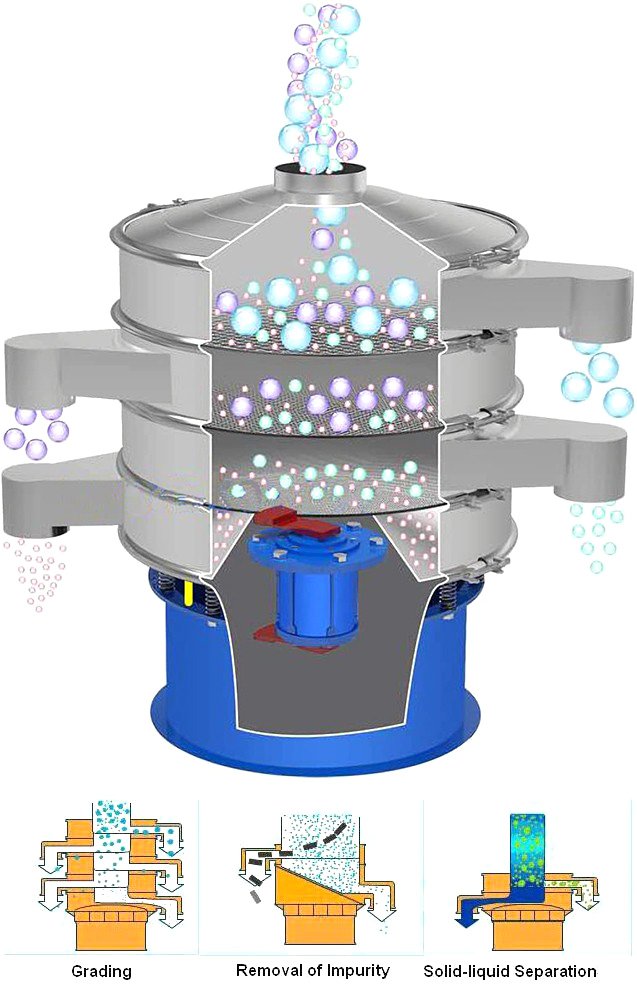
Vibrating sifter is a vibrating separator for separating powders, granules and liquid slurries. It accurately removes excess contaminants and is ideal for inspecting and screening your materials on the secondary side of your production equipment, from the primary side to the finished product. . You can separate 5 different sizes of materials in one operation. It allows production throughputs from 100 to 3300 kg/h, depending on the product, mesh size and feed flow of the machine. It is suitable for screening from 2 to 500 mesh.
Vibrating sifter models are available in diameters of 400mm, 600mm, 800mm, 1000mm, 1200mm, 1500mm, and 1800mm, and can also be specially customized for you.
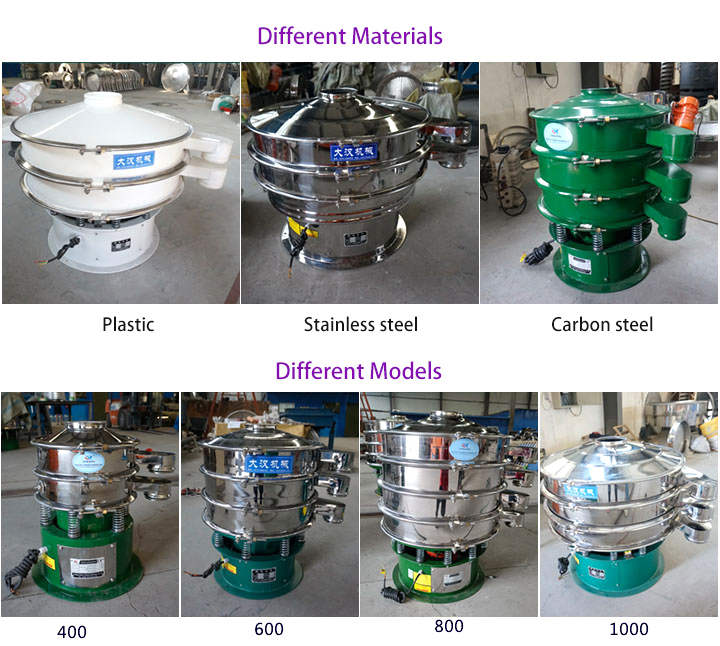
Ordinary Vibrating Sifter

It makes the material move on the screen through the action of vibration force, and separates or sorts the particles according to their size.
Mesh size(mesh):2-500
Capacity(kg/h):100-3300
Ultrasonic Vibrating Sifter

On this basis, an ultrasonic vibration system is introduced to use the effect of ultrasound to perform more fine screening and grading of materials.
Mesh size(mesh):635
Capacity(kg/h):100-5000
Inline Vibrating Sifter
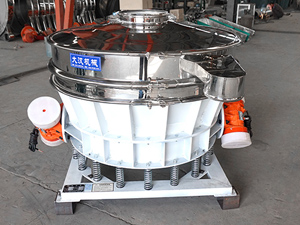
Rough inspection, screening and impurity removal of powders and granules, ideal for screening incoming ingredients and final production inspection of finished products
Mesh size(mesh):140
Capacity(kg/h):3000-30000
Sigle-layer Vibrating Sifter
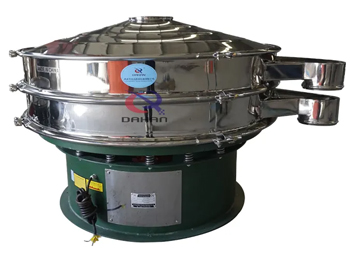
It has only one layer of screen and two discharge ports, and has a simple structure. It is mainly used to screen the material once, and divide the material into two parts, which are larger than the screen hole and smaller than the screen hole.
Double-layer Vibrating Sifter
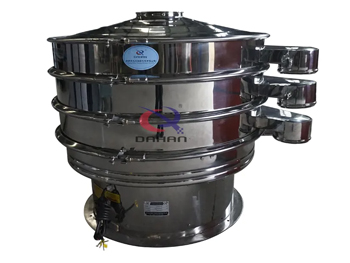
It has two layers of screens with different apertures and three discharge ports, which can divide the material into three parts at one time, namely, larger than the aperture of the upper screen, between the apertures of the two screens, and smaller than the aperture of the lower screen.
Multi-layer Vibrating Sifter
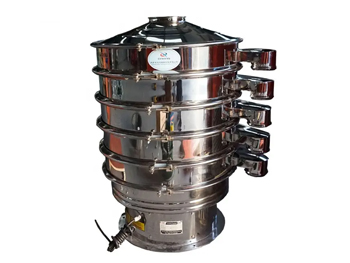
It has multiple screens, and the screen aperture decreases gradually from top to bottom. Up to 4 layers of screens with different mesh sizes can be installed, which can divide the material into multiple particle sizes at one time and realize multi-stage screening.
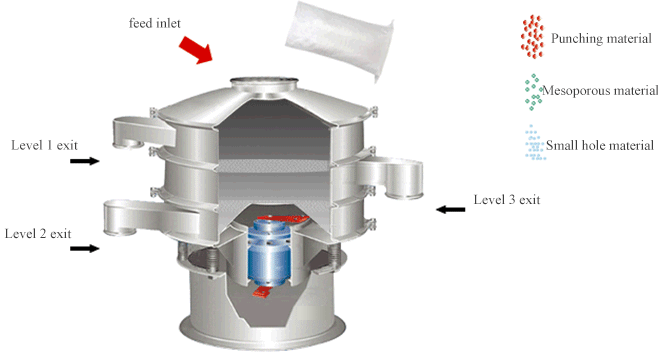
After the vibrating sifter is started, the heavy hammer is driven by the motor to vibrate, and the screen body produces horizontal, vertical, and inclined three-dimensional motion, so that the material is thrown up on the screen and rotates outward from the center to the discharge port to be discharged. The material is discharged in the screen. During the movement of the net, fine particles or liquids pass through the screen, and the materials are screened, classified or filtered by selecting and installing the corresponding screen and the number of screen layers. The sorted materials are automatically discharged from their respective outlets.
Efficient Separation
Vibrating sifters excel at separating materials with high efficiency. The rapid, oscillatory motion of the screen ensures precise particle separation, allowing for accurate size classification.
High Throughput
These machines can handle large volumes of material, making them ideal for high-production environments. They are designed to process materials continuously, maximizing productivity.
Versatility
Vibrating sifters are versatile and can be adapted to handle a wide range of materials, including powders, granules, and small particles. They are suitable for industries such as food processing, pharmaceuticals, chemicals, and mining.
Precise Screening
With adjustable vibration intensity and screen mesh sizes, vibrating sifters can achieve precise screening results. This ensures that the separated materials meet specific quality standards.
Dust Containment
Some vibrating sifters come with dust containment systems, which help maintain a clean working environment and prevent product contamination.
Reduced Downtime
Regular maintenance and cleaning of vibrating sifters can help prevent clogging and ensure continuous operation, reducing downtime in production processes.
| Model | Diameter (mm) |
Feeding Size (mm) |
Frequency (RPM) |
Layers | Power (kw) |
Capacity (kg/h) |
| DH-400 | 400 | <10 | <1500 | 1-5 | 0.18 | 100 |
| DH-600 | 600 | 0.25 | 200 | |||
| DH-800 | 800 | 0.55 | 500 | |||
| DH-1000 | 1000 | 0.75 | 800 | |||
| DH-1200 | 1200 | 1.1 | 1200 | |||
| DH-1500 | 1500 | 1.5 | 1800 | |||
| DH-1800 | 1800 | 2.2 | 2000 |
| Model | Edge-added type | Gate type | Filtration type | High frequency type | Gas protected type | Silo Type |
| Image | 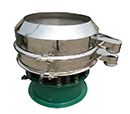 |
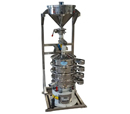 |
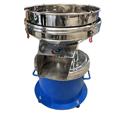 |
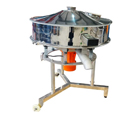 |
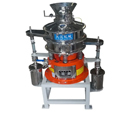 |
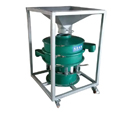 |
| Application | Enlarged inlet design to prevent material splashing, easy to observe the screen, suitable for filtering liquids | The gate type design can extend the screening time, improve the screening accuracy, and allow more materials to enter and less to exit | Designed for filtering liquids, suitable for slurries with small processing volumes and few impurities | Using high frequency vibration motor (3000 rpm) as the excitation source, it is suitable for filtering high concentration slurries, such as ceramic glazes, etc. | During the screening process, inert gas is introduced into the screen box to form a closed gas environment. It is mainly used to screen some materials that are sensitive to oxygen or easily oxidized, such as metal powders, 3D printing materials, etc. | It can realize continuous feeding and screening of materials by directly installing the silo on the vibrating screen, greatly improving production efficiency. It is suitable for screening various powdery and granular materials. |
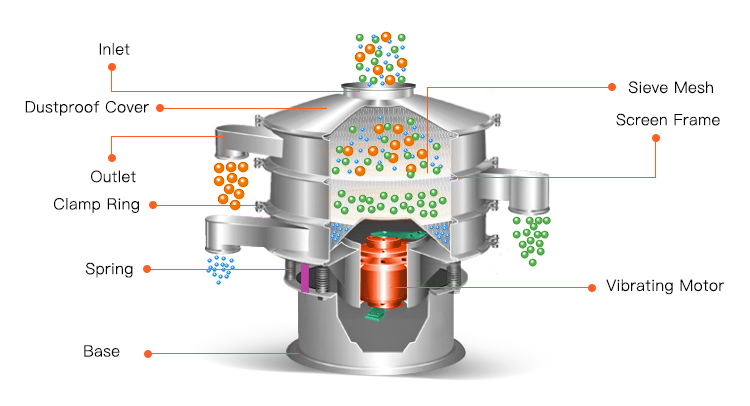
Screen Frame: The screen frame provides support for the screen panels or mesh and holds them in place. It is usually made of steel or other sturdy materials to withstand the vibration and screening process.
Screen Panels or Mesh: The screen panels or mesh are the main screening surface where the material is separated based on particle size. They are typically made of woven wire mesh, perforated plates, or synthetic materials with specific opening sizes to allow undersize particles to pass through.
Vibrating Motor: The vibrating motor is responsible for generating the vibration that moves the screen surface. It is usually mounted on the side or underneath the screen frame. The motor's rotation or eccentric weight creates the necessary vibration for the screening process.
Support Structure: The support structure provides stability and rigidity to the vibrating sifter. It may consist of a base frame, legs, and cross beams. The support structure is designed to minimize vibrations transmitted to the surrounding environment.
Drive System: The drive system transmits power from the motor to the screen frame, causing it to vibrate. It typically includes a motor, belts or gears, and pulleys or shafts.
Springs or Rubber Mounts: Springs or rubber mounts are used to isolate and dampen vibrations, ensuring smooth operation and reducing noise transmission.
Discharge Chutes: The vibrating sifter may have separate discharge chutes for the undersize and oversize fractions. These chutes direct the separated fractions to their respective outlets or collection points.
Control Panel: Some vibrating sifters are equipped with a control panel that allows operators to adjust the vibration intensity, screen inclination, and other operating parameters.
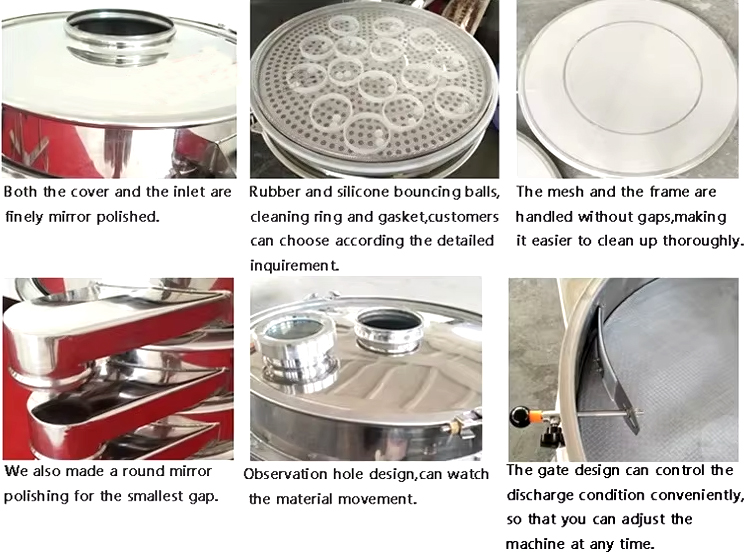
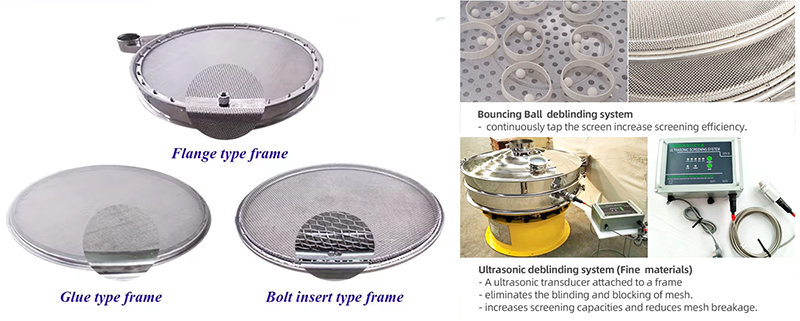
| Material | SUS304 stainless steel: mainly used in medicine, food and other industries, SUS304 high-quality stainless steel features: high temperature resistance, high toughness. | Q235A carbon steel: mainly used in the chemical industry, Q235A carbon steel features: good toughness and plasticity. |
| Grid | Adhesive mesh frame: high cleanliness, the whole mesh frame has no dead angle, the screen is directly bonded to the mesh frame, and the screen wire head and corners are not retained; suitable for the food and pharmaceutical industries. | Sub-mother grid: suitable for materials with large specific gravity and strong elaboration, the screen is easy to replace and difficult, and the cost of screen replacement is low; suitable for chemical and metallurgical industries, etc. |
| Cleaning device | The use of the retaining ring and the pinball is a common cleaning device, which is generally used for 100-200 mesh screens. | Ultrasonic cleaning device: generally used for 400-500 mesh screen, features: high efficiency, good cleaning effect. |
| Seals | Rubber seals: mainly used in the chemical industry, high and low temperature resistance, ozone resistance, good electrical insulation. | Silicone seals: mainly used in the food and pharmaceutical industries, with high adsorption performance and good thermal stability. |
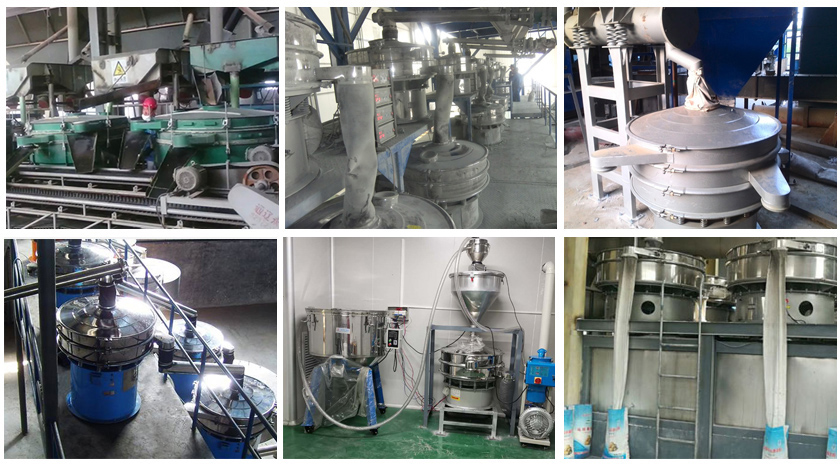
Food industry: flour, starch, milk powder, monosodium glutamate, soy milk, fruit juice, soy sauce, vinegar, etc.
Chemical industry: resin powder, paint, washing powder, micro powder, paint, soda ash, lemon powder, rubber, plastic, etc.
Pharmaceutical industry: Chinese medicine powder, Chinese medicine liquid, western medicine powder, western medicine liquid, Chinese and western medicine granules, etc.
Metallurgical industry: titanium oxide, zinc oxide, electromagnetic materials, metal powder, welding rod powder, etc.
Abrasives, ceramics industry: alumina, quartz sand, mud, spray soil particles.
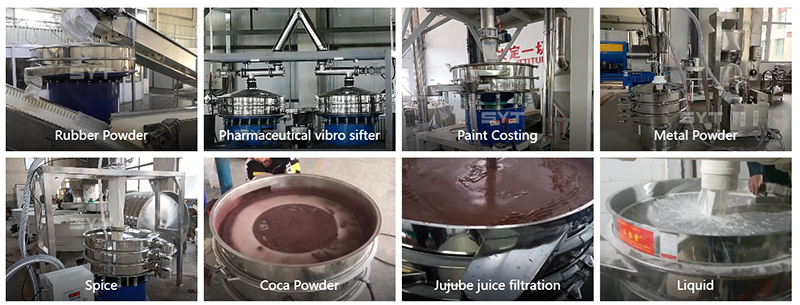
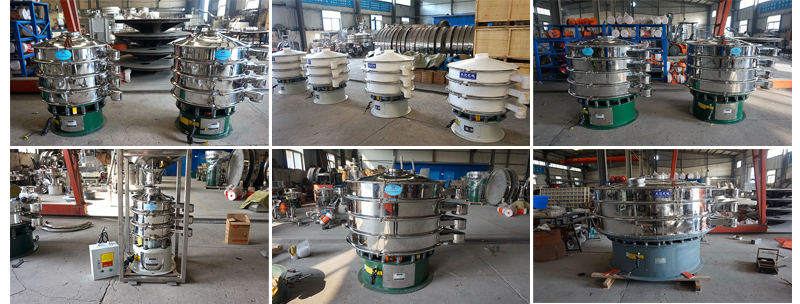
Address:China,Yanjin county forest park gate to the west 1000 meters north road.